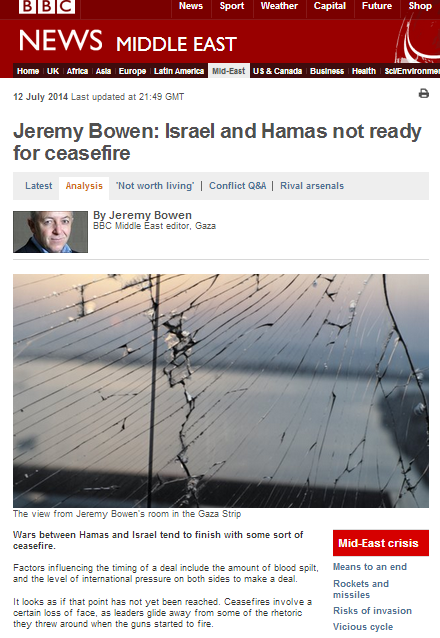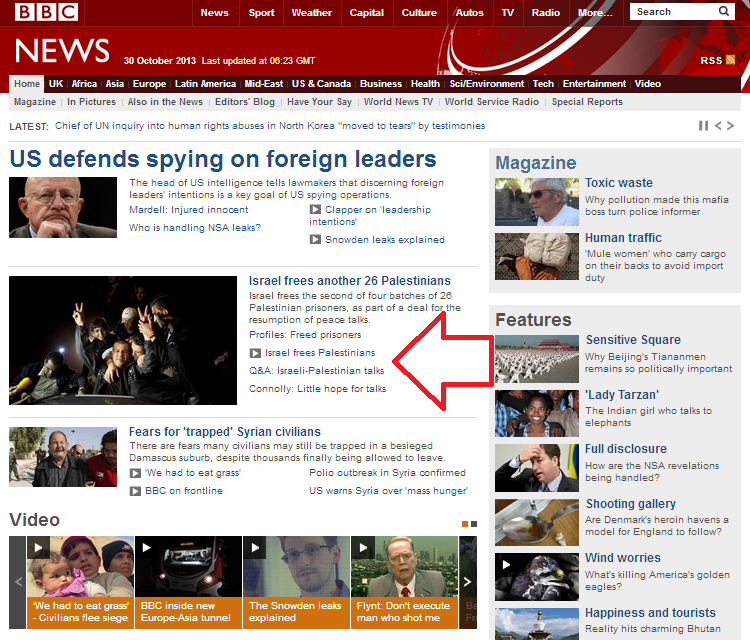Back in 2006, the role of BBC Middle East editor was described thus:
“The challenge for our daily news coverage is to provide an appropriate balance between the reporting of a ‘spot news’ event and the analysis that might help set it in its context.
This challenge is particularly acute on the television news bulletins, where space is at a premium, and because the context is often disputed by the two sides in the conflict. To add more analysis to our output, our strategy is to support the coverage of our bureau correspondents with a Middle East editor.
Jeremy Bowen’s new role is, effectively, to take a bird’s eye view of developments in the Middle East, providing analysis that might make a complex story more comprehensive or comprehensible for the audience, without the constraints of acting as a daily news correspondent. His remit is not just to add an extra layer of analysis to our reporting, but also to find stories away from the main agenda.”
Notably, some of the recent “context” and “analysis” provided by Jeremy Bowen since his arrival in the Gaza Strip on July 11th has actually done the exact opposite by herding audiences towards a narrow and misleading view of the current conflict between Israel and terrorist organisations in the Gaza Strip as being a consequence of the fact that an independent Palestinian state has not yet come into being.
In both Bowen’s filmed reports shown on BBC television news and promoted on the BBC News website on July 11th (here and here) he wound up his items with the following words:
“There’s a terrible familiarity – a sameness – about what’s been happening in the last few days and that’s because it’s happened before. The underlying political realities of the conflict haven’t been tackled. Many Israelis would say that’s because Palestinians won’t accept the existence of their state. Palestinians and plenty of others say the problem is that they don’t have independence. That if they had their own state, things might be very different. The latest peace talks collapsed recently. In the past, death, destruction and human pain have filled the gap left by failed negotiations. It’s happened again.”
In a written report titled “Jeremy Bowen: Israel and Hamas not ready for ceasefire” which appeared on the BBC News website on July 12th under the heading ‘analysis’, Bowen wrote:
“Small wars break out between the two sides regularly. This one has been brewing for months, long before the kidnap and murder of three Israeli youths and the revenge killing of a Palestinian teenager.
The reason is that the underlying political realities of the conflict between Israel and the Palestinians have not been settled.
Hamas rejects any peace talks with Israel.
The Israelis were criticised, indirectly, by their allies in the White House and state department after the collapse of the last round of negotiations with Fatah, the other main Palestinian faction.
It seems clear that the periodic small wars between Hamas and Israel will keep happening, like a gory Groundhog Day, until the conflict between Palestinians and Israelis is at least made safe and stable, if not settled outright.
If that doesn’t happen, the chances are that the fights will break out more often, morphing into an attritional struggle that neither side would win.
The wider Middle East is highly unstable. That means a greater chance of the conflict in and around Gaza spreading its poison further afield.”
Readers may also recall that in an interview with BBC Radio 4’s ‘Today’ programme on July 3rd, Bowen responded to a question from presenter John Humphrys thus:
JH: “The Jerusalem Post is writing this morning about the murder of the teenagers obviously and it says this: ‘it’s another reminder that swathes of Palestinian society continue to be irreconcilably committed to Israel’s destruction’. Is it the case that it’s not just terrorist organisations such as Hamas that are bent on Israel’s destruction, but the Palestinian people generally are irreconcilably opposed to the existence of Israel?”
JB: “No, I don’t think that’s the case. I think the vast majority of Palestinians are absolutely reconciled to the existence of Israel. What they’re not reconciled to is the continuing occupation of land taken in 1967, the growth of settlements. You know you’ve heard all this many times before and it was interesting as well – and telling, I think – to see the mother of the Palestinian teenager who was killed saying Palestinians have no rights and I think that they feel that there’s one law for Israelis and one law for themselves and that they’re never going to be in a better place until they get independence, get their own state and that, I think, is the prevalent view among Palestinians.”
Let’s have a look at what Bowen has to conceal from audience view in order to persuade them that Hamas, the PRC, the Palestinian Islamic Jihad, the Al Aqsa Martyrs Brigades, the PFLP and numerous other terrorist groups of various stripes would desist from firing missiles at Israeli civilians if only a Palestinian state came into being.
First of all, there’s the rather obvious fact that violence against Jews and later Israelis predates the existence of Israel and the first organized terror group – Fatah – predated the 1967 war and ‘the occupation’. Secondly, as Bowen himself writes, Hamas opposes any sort of negotiations with Israel and its virulently antisemitic charter – echoed frequently in statements by Hamas’ leadership – rejects Israel’s right to exist. Hamas’ terrorist activity has often been aimed at undermining the PA’s ability to negotiate with Israel and when negotiations have made some sort of headway – as was the case in the mid-1990s – Hamas did its level best to scupper any agreements reached.
Another aspect to this is Bowen’s inversion of reality by means of the following statement:
“The wider Middle East is highly unstable. That means a greater chance of the conflict in and around Gaza spreading its poison further afield.”
That pronouncement erases from the equation important incoming factors in the Gaza Strip such as Iranian funding, training and weapons supplies for terrorist organisations such as Hamas and the Palestinian Islamic Jihad. It also ignores (not for the first time, as the above Radio 4 interview shows) the topic of the rising number of Salafist-Jihadists in the Gaza Strip.
Equally important is Bowen’s focus on the recent round of negotiations.
“The Israelis were criticised, indirectly, by their allies in the White House and state department after the collapse of the last round of negotiations with Fatah, the other main Palestinian faction.”
As we documented here at the time, the BBC’s messaging to audiences – conveyed, significantly, exclusively by Jeremy Bowen himself – was that Israel was to blame for the breakdown of those talks. BBC audiences therefore already ‘know’ why there is no peace and no Palestinian state and so when Jeremy Bowen claims that the terror emanating from the Gaza Strip would cease if there was such a state, they also ‘know’ which party is responsible for the fact that warheads are being fired at its civilians.
But in the world according to Jeremy Bowen, if only Israel would vacate “land taken in 1967” and stop the “growth of settlements”, then all could be “very different”. The problem with that theory of course is that it has already been tested. Next month will mark nine years since Israel left the Gaza Strip and dismantled all the towns and villages there, but instead of peace and instead of a Palestinian effort to build a viable economy and a society preparing itself for statehood, terrorism against Israel only increased.
Another aspect of coverage of the current events in Israel and the Gaza Strip by Jeremy Bowen and his colleagues is no less important for complete evaluation of the framing of their ‘root cause’ by Bowen.
To date, the BBC has completely failed to report the fact that terrorist groups linked to Fatah – the dominant party in both the PLO and the PA – have, according to their own announcements, been playing an active part in the hostilities. Likewise, as previously noted here, the BBC’s reporting has made no effort to inform audiences of the incitement and glorification of terror coming from Fatah and PA sources.
Of course there is nothing novel about such serious omissions: the BBC consistently refrains from reporting Fatah and PA incitement and glorification of terrorism, with the examples during the recent kidnappings of three Israeli teenagers being just the latest.
Together with all that, the BBC is also consistent in avoiding informing audiences of the real significance of the fact that the Palestinian unity government inaugurated at the beginning of June made no effort to disarm the plethora of terrorist organisations – including Hamas – in the Gaza Strip in order to comply with existing agreements with Israel and the resulting ‘Hizballah model’ whereby an internationally recognized terror group retains its own rival militia whilst at the same time being party to a government.
So instead of being presented with a realistic and accurate picture of the situation as it exists, BBC audiences are being steered towards an inaccurate and dumbed-down caricature according to which only ‘the occupation’ and ‘settlements’ matter. That framing of the issue does not allow audiences to arrive at informed opinions on the issues faced by Israel or to understand the rationale behind its actions. But that failure to meet the BBC’s obligations under the terms of its public purposes remit is of course likely to continue for as long as the current Middle East editor – and his idée fixe – remains at the helm.




